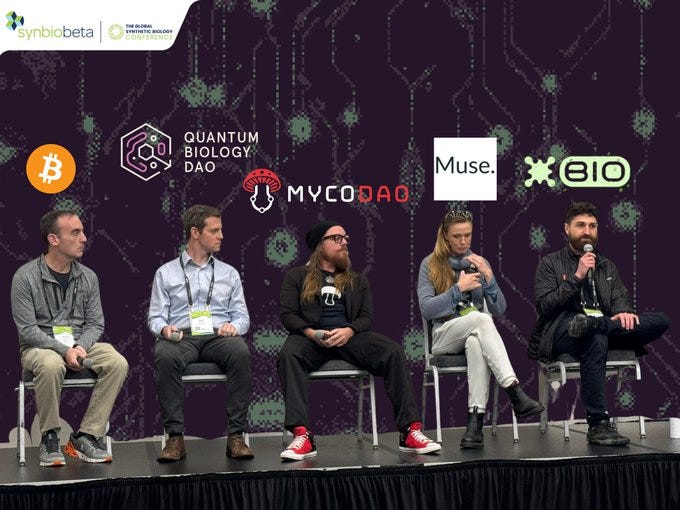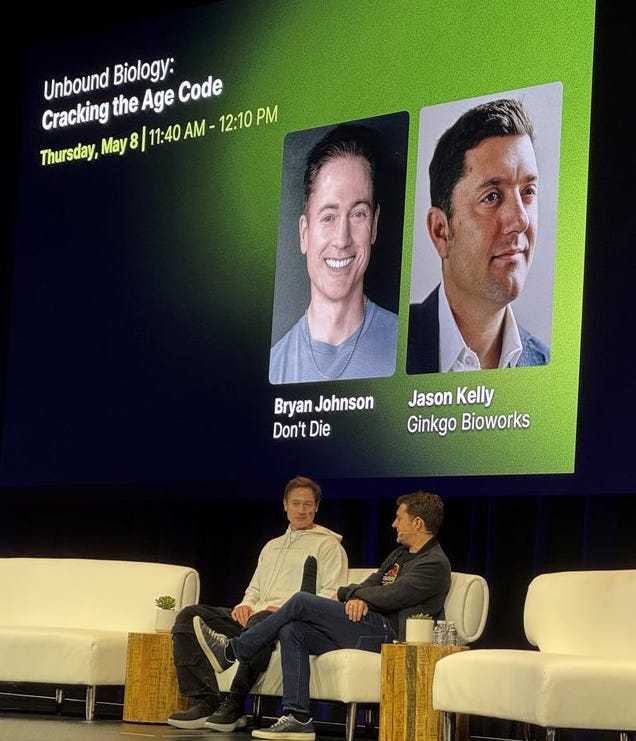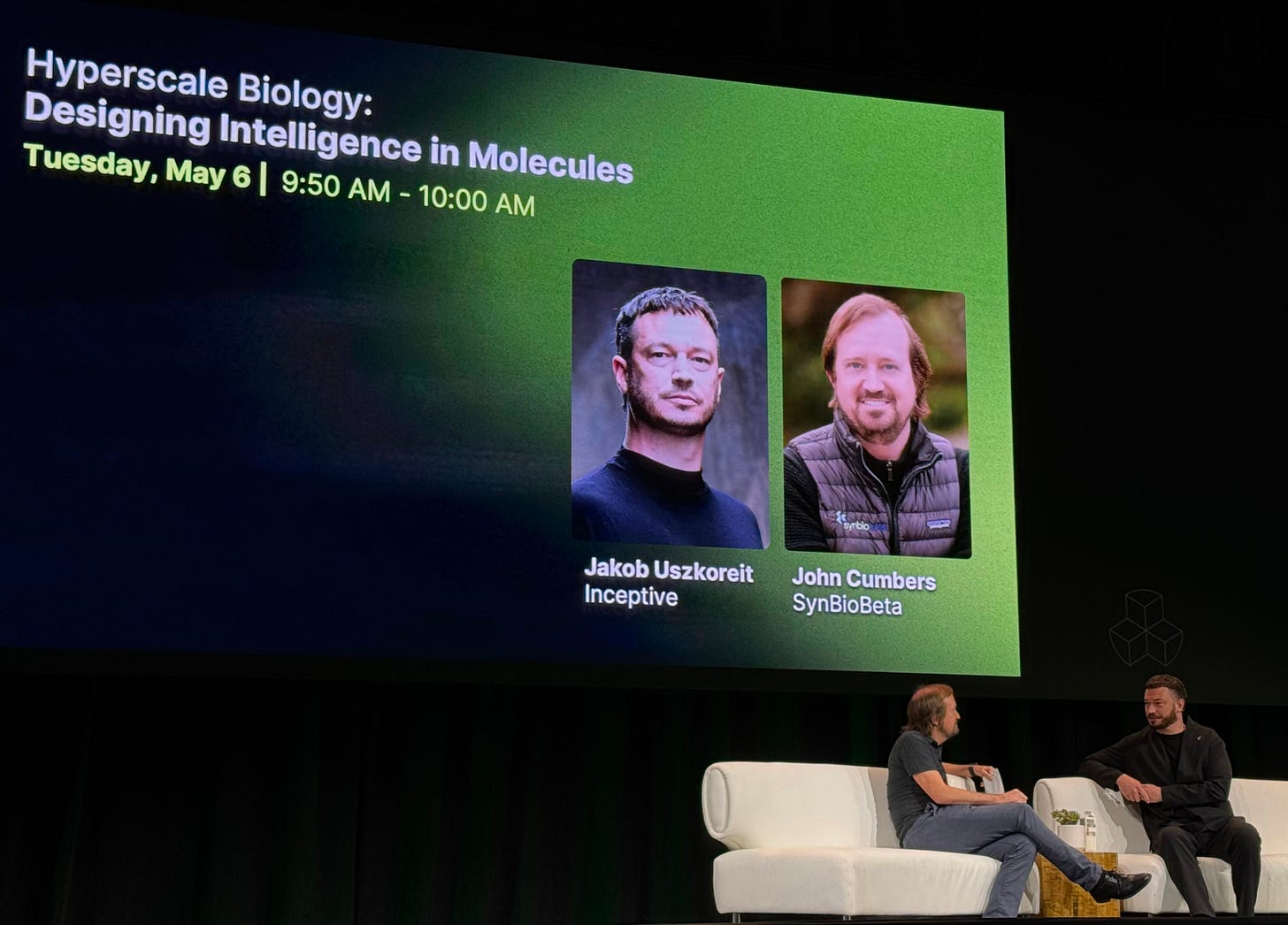Personal Science Week - 250515 SynBioBeta
What I learned at the Synthetic Biology Conference
I really don’t know that much about biology. But then, who does?
This week is a short summary of the big takeaways I got from attending this year’s Global Synthetic Biology Conference in San Jose.
If you have a degree in computer science from a decade or more ago and you haven’t kept up, you might as well surrender your credentials. Except for some of the basics of theory, most of what you learned long ago is now obsolete and you would have a difficult time passing a basic job interview. This is even more true if you have a degree in one of the biological sciences.
Sure, some of the basics haven’t changed. The computer science concept of NP-completeness is useful even if you don’t know the latest programming languages and tools. Similarly, the Central Dogma and its implications are still relevant even if you don’t know computational biology or CRISPR. But everything practical—what you’d need for a good job—changes so quickly that staying current is essential.
Conversely, even if you didn’t study these subjects formally, you can hold your own against the credentialed experts by simply staying on top of the latest developments. This is especially true if you focus yourself on practical, everyday applications that let you directly apply what you learn to problems and situations of your daily life. Personal scientists have an edge here because that’s what we do all the time.
Last week I attended the Global Synthetic Biology Conference, a gathering of thousands of people at the cutting edge of the future of life science. Most of the other attendees were from the classic biology world: working on medical applications, often in labs wearing white coats. My day job is consumer healthtech—making advanced technology to help normal people live healthier, better lives—so much of the conference was outside my normal focus, but I met many interesting people and learned a ton that I think will be useful to other personal scientists. I won’t try to summarize the whole conference, but here are a few big takeaways that I thought were most interesting.
DeSci
The highlight of my week was invitation I received to join the “Bio/acc and Biohack” panel discussion led by Decentralized Science (#Desci) booster Jocelyn Pearl, who organized a lively conversation between Patrick Joyce (ResearchHub), Shelby Newsad (Compound VC), Jeffrey (Cassox) Tibbetts (Symbiont Labs). Personal scientists like to point out that “Technology moves faster than science”, but another plank in our innovation toolkit is the ability to quickly jump on new opportunities in areas that slow-moving government and other institutions haven’t yet discovered. Places like the TAM Center in Mexico, or Prospera in Honduras are bringing state-of-the-art therapeutics to willing patients without the the long timetables of the US regulatory agencies.
Instead of clinicians waiting for research scientists to come up with breakthroughs (“bench-to-bedside”), what if the clinicians were free to make discoveries directly with patients (“bedside-to-bench-to-bedside”). That optimistic attitude toward new ideas is of course exactly what we do in personal science.
But serious science costs money, and that’s where new funding models like Decentralized Science (DeSci) are important. Another session “Accelerating Scientific Development Using Crypto Networks” featured people like James Sinka from Bio.xyz and Morgan Rockwell from MycoDAO, with funding models that let normal people contribute to science.

More Science on the Edge
You’ve heard of Neurolink, Elon Musk’s Brain Computer Interface (BCI) company. One of its co-founders, Max Hodak, has a new startup, Science.xyz that’s doing a whole range of “neural engineering” products. Max seems like a super-smart guy, so I took notice of his confident prediction that, because of the fast pace of AI development, it’s impossible to make predictions beyond 2032, the year when he thinks we’ll see “Artificial Super-Intelligence” (ASI), computers way smarter than we can imagine. I disagree with him (mainly because I think “intelligence” is poorly defined) but it was a fascinating discussion: a panel that included Jeanne Loring (Aspen Neuroscience, Scripps Research, working on a stem cell-based therapy for Parkinsons and more), Sumner Norman (Forest Neurotech), Andrew Payne (E11 Bio, a non-profit working on brain connectomics).
Mark Budde, CEO of Plasmidsaurus (the super-cheap sequencing company we mentioned in PSWeek250417) talked about his company’s focus on fast turnarounds and low prices. After meeting them later at their show exhibit, my brain is spinning as I think of cool new personal science projects that can be done for using some of their sub-$100 prices.
Generation Lab is a longevity company co-founded by Alina Rui Su and Irina Conboy (who pioneered the “blood boy” idea of exchanging blood between old and young people). They now sell a $400 kit to measure the biological age of 19 different organs. It’s based on a 2023 paper they published in Aging. They claim we age in “spurts”, including a big one that starts in your 50s and can be slowed with special interventions.
Famous Speakers
Although all of the keynotes were from people well-known in the synthetic biology community, a few of the speakers are well-known beyond that. Peter Diamandis, founder of XPRIZE, Singularity University, and many other health and space-related ventures. Besides his usual observations about the wonderful future we can expect from technology, he expressed hope that amidst the shakeup happening in the US Government’s approach to science, we can have some major deregulation in how we conduct advanced longevity research. “It’s insane”, he says, that people have to leave the US to get advanced stem cell treatments, for example (exactly what we agreed in our Bio/acc and Biohack session)
Bryan Johnson has been attending SynBioBeta since long before his recent fame as a longevity guinea pig. We’ve been watching Bryan since he started his longevity Blueprint and have been wary of some of his lack of openness. His talk with Jason Kelly, founder of Ginkgo Bioworks was largely about his “Don’t Die” ideas, including his proposal for a new “ideological movement” that he says always follows new technological revolutions.
He describes a divide between AI pessimists and optimists, driven by those who assume “the past is the same as the future”, a view he rejects, arguing that nobody knows the future due to AI’s unprecedented trajectory. AI is leading humanity toward an event horizon, where humans will no longer fully control outcomes, fundamentally reshaping society’s operating systems.
I don’t disagree, though I think Bryan overestimates the degree to which anybody in the past understood the future either. Humans are more adaptable—and more special—than I think he and others give us credit for. That said, I came away sensing that — beyond whatever criticisms he gets for being overly self-promoting—he seems genuinely interested in a positive role for technology. I also appreciate his interest in democratizing AI, creating a “vector” for non-AI developers (e.g., synthetic biology innovators) to contribute to safe, accessible AI advancements.
Really Big Ideas
Finally, some of the Really Big Ideas aren’t quite ready yet for personal science, but are so cool that I can’t help but note them:
Jason Chin at Constructive.bio has a way to reprogram the genetic code. I know enough molecular biology to have been long intrigued at why nature has chosen to encode only 20 amino acids, when the genetic code (“AGCT”) should be able to handle 4^3 = 64 different combinations. Chin’s team hacks life with new codons to incorporate non-natural, aka non-canonical amino acids (ncAAs) using engineered ribosomes, tRNAs, and synthetases. Their synthetic E. coli strain, Syn61, with a 61-codon genome, frees codons for novel molecules. They can make new proteins and polymers with unique properties, such as enhanced stability or novel chemical reactivities, for applications in therapeutics, biomaterials, and sustainable manufacturing.
Constructive’s head of R&D, Daniel de la Torre gave a follow-on talk explaining how these ncAAs can be used to build GLP-1 analogues that can be more easily manufactured with fermentation, and Antibody-Drug Conjugates (ADCs) with precision conjugation (site-specific, controlled DAR) and multiple payloads (e.g., tubulin inhibitors, topoisomerase inhibitors) for enhanced cancer therapy.
Jakob Uszkoreit, co-author of the seminal 2017 "Attention is All You Need" paper that sparked the large language model (LLM) revolution, is now pioneering RNA-based therapeutics at Inceptive. Inceptive applies LLM principles to molecular design, training models on vast biological datasets to predict and generate novel RNA sequences with therapeutic potential. Similar to how ChatGPT generates text by modeling language patterns, Inceptive’s platform is supposed to design RNA molecules with optimized functions, accelerating the development of precision medicines. Jakob describes Inceptive as a “beach” company, living on the edge between “wet” and “dry” biology.
There’s much more to say about SynBioBeta, but as with most things these days, I’ll let you explore yourself using your favorite LLM. For example, here’s a 10-page summary from Grok.
About Personal Science
Decades ago, you needed serious money and credentials to access the power of digital computing, but technology eventually gave personal computing to everyone. We think the same is happening to science and we call it Personal Science: the discipline of applying the techniques of science to everyday, personal situations.
As LLMs become increasingly powerful, you don’t another weekly newsletter that tells you how to do something. Personal Science Week is a human-written account of what a normal person does to learn more about the world and solve everyday problems.
If you have other topics you’d like to discuss, please let us know.



